The AMD 3rd Gen Ryzen Deep Dive Review: 3700X and 3900X Raising The Bar
by Andrei Frumusanu & Gavin Bonshor on July 7, 2019 9:00 AM EST** = Old results marked were performed with the original BIOS & boost behaviour as published on 7/7.
Benchmarking Performance: Web Tests
While more the focus of low-end and small form factor systems, web-based benchmarks are notoriously difficult to standardize. Modern web browsers are frequently updated, with no recourse to disable those updates, and as such there is difficulty in keeping a common platform. The fast paced nature of browser development means that version numbers (and performance) can change from week to week. Despite this, web tests are often a good measure of user experience: a lot of what most office work is today revolves around web applications, particularly email and office apps, but also interfaces and development environments. Our web tests include some of the industry standard tests, as well as a few popular but older tests.
We have also included our legacy benchmarks in this section, representing a stack of older code for popular benchmarks.
All of our benchmark results can also be found in our benchmark engine, Bench.
WebXPRT 3: Modern Real-World Web Tasks, including AI
The company behind the XPRT test suites, Principled Technologies, has recently released the latest web-test, and rather than attach a year to the name have just called it ‘3’. This latest test (as we started the suite) has built upon and developed the ethos of previous tests: user interaction, office compute, graph generation, list sorting, HTML5, image manipulation, and even goes as far as some AI testing.
For our benchmark, we run the standard test which goes through the benchmark list seven times and provides a final result. We run this standard test four times, and take an average.
Users can access the WebXPRT test at http://principledtechnologies.com/benchmarkxprt/webxprt/
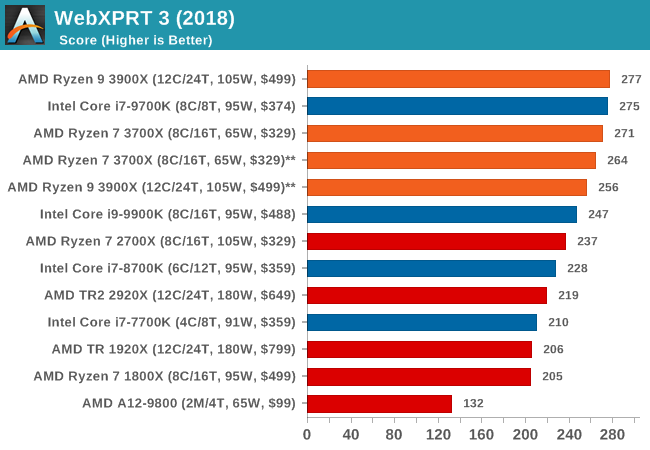
WebXPRT 2015: HTML5 and Javascript Web UX Testing
The older version of WebXPRT is the 2015 edition, which focuses on a slightly different set of web technologies and frameworks that are in use today. This is still a relevant test, especially for users interacting with not-the-latest web applications in the market, of which there are a lot. Web framework development is often very quick but with high turnover, meaning that frameworks are quickly developed, built-upon, used, and then developers move on to the next, and adjusting an application to a new framework is a difficult arduous task, especially with rapid development cycles. This leaves a lot of applications as ‘fixed-in-time’, and relevant to user experience for many years.
Similar to WebXPRT3, the main benchmark is a sectional run repeated seven times, with a final score. We repeat the whole thing four times, and average those final scores.
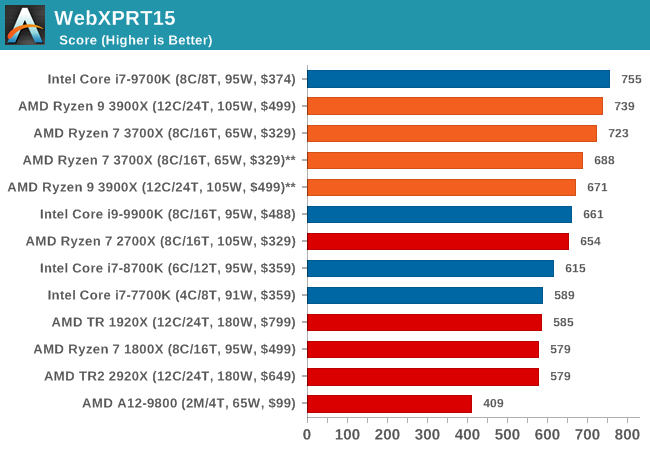
Speedometer 2: JavaScript Frameworks
Our newest web test is Speedometer 2, which is a accrued test over a series of javascript frameworks to do three simple things: built a list, enable each item in the list, and remove the list. All the frameworks implement the same visual cues, but obviously apply them from different coding angles.
Our test goes through the list of frameworks, and produces a final score indicative of ‘rpm’, one of the benchmarks internal metrics. We report this final score.
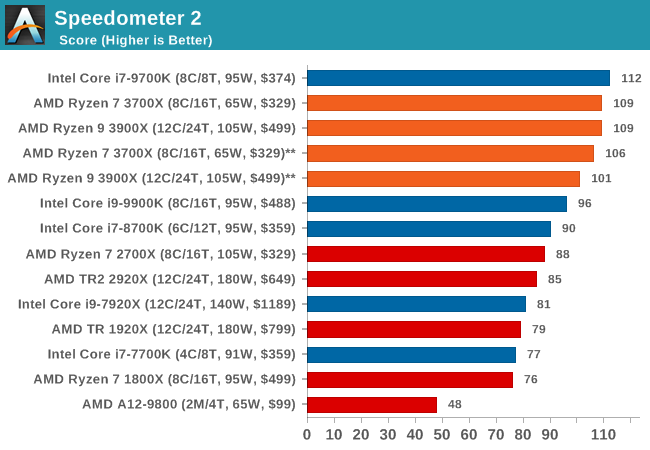
Google Octane 2.0: Core Web Compute
A popular web test for several years, but now no longer being updated, is Octane, developed by Google. Version 2.0 of the test performs the best part of two-dozen compute related tasks, such as regular expressions, cryptography, ray tracing, emulation, and Navier-Stokes physics calculations.
The test gives each sub-test a score and produces a geometric mean of the set as a final result. We run the full benchmark four times, and average the final results.
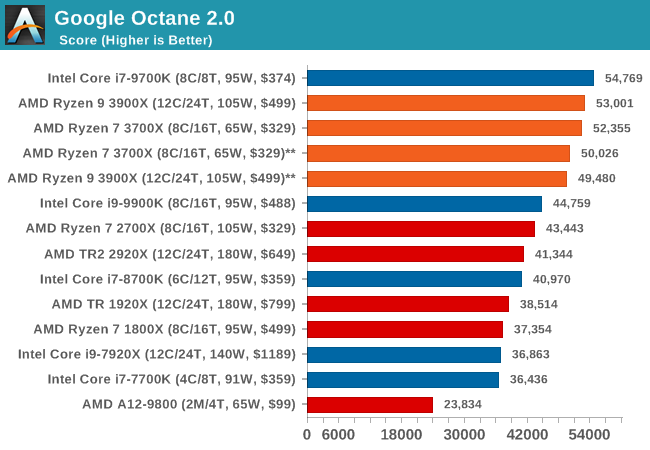
Mozilla Kraken 1.1: Core Web Compute
Even older than Octane is Kraken, this time developed by Mozilla. This is an older test that does similar computational mechanics, such as audio processing or image filtering. Kraken seems to produce a highly variable result depending on the browser version, as it is a test that is keenly optimized for.
The main benchmark runs through each of the sub-tests ten times and produces an average time to completion for each loop, given in milliseconds. We run the full benchmark four times and take an average of the time taken.
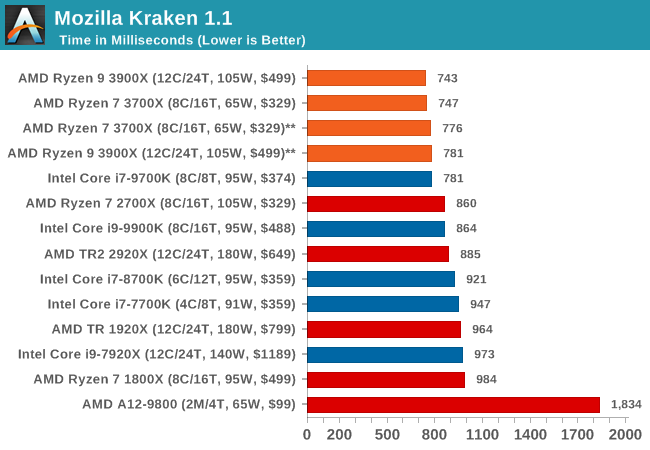
Web Tests Analysis
Overall, in the web tests, the new Ryzen 3900X and 3700X perform very well with both chips showcasing quite large improvements over the 2700X.
We’re seeing quite an interesting match-up against Intel’s 9700K here, which is leading all of the benchmarks. The reason for this is that SKU has SMT turned off. The singe-threaded performance advantage of this is that the CPU core no longer has to share the µOP cache structure between to different threads, and has the whole capacity dedicated to one thread. Web workloads in particular are amongst the most instruction pressure heavy workloads out there, and they benefit extremely from turning SMT off on modern cores.
Whilst we didn’t have the time yet to test the new 3900X and 3700X with SMT off, AMD’s core and op cache works the same in that it’s sharing the capacity amongst two threads, statically partitioning it. I’m pretty sure we’d see larger increases in the web benchmarks when turning off SMT as well, and we’ll be sure to revisit this particular point in the future.










447 Comments
View All Comments
Korguz - Tuesday, July 9, 2019 - link
there is NO fraud about this.. better yet... where is your PROOF about this ? post some links to sites that are showing this.. if not drop it already.. you are just trying to spread lies, and BS...Maxiking - Tuesday, July 9, 2019 - link
My proof is this and any review on the internet, the advertised 4.6ghz is not being reached on the majority chips and if, only for 100 - 200ms and very sporadically. This is called FRAUD, I guess Intel should start selling their cpus with 5.3ghz boost because a few of them would be able to reach it for 100ms after pumping a lot of voltage into them like AMD does.PACougar - Tuesday, July 9, 2019 - link
Lol, a boost frequency is exactly that. It doesn't mean the chips will sustain the boost for any guaranteed period of time. Do you really think it's just a coincidence that you're the only one that's "outraged" by the expected operation of these chips? Guess what, when Intel ships a chip with a stated frequency, it's also a boost with no guarantee of duration. Stock 9900k's don't run continuously at 5ghz. Lol You look like a complete fool for talking about fraud where there is none.Korguz - Tuesday, July 9, 2019 - link
yea ok sure.. what ever maxiking.. you have NO idea how boost works, OR what the difference is between boost and max all core turbo is. the fact you wont post links to other sites that show this, also proves your are just trying to spread lies and BS. the only fraud i am seeing.. is you...Maxiking - Tuesday, July 9, 2019 - link
We are on the side which confirms my words in the review, forums, by their tweets. Yet you are blind to the facts. Check derbauer, gaming nexus, not gonna spoonfeeding you.Korguz - Tuesday, July 9, 2019 - link
let me ask you this... maxiking.. do you know the difference between boost clock. and all core turbo ? cause it sure seems you do NOT know the difference.. and others have pointed out to you that you are also wrong.. i wanted links.. to be sure i am looking at the same sites as you.. in the end.. you are just trolling.. and talking bs... drop this already..Qasar - Wednesday, July 10, 2019 - link
Check derbauer, gaming nexus... never heard of these sites.. i can see why Korguz is asking you to post links directly to where you are getting this, and i agree, BS from...Maxiking - Tuesday, July 9, 2019 - link
There is a debate going about this on every internet forum, so no I am not the only one concerned and the AMD subreddit has a dedicated thread about it as well.If Intel ships a chip with any stated boost frequency, the boosts are guaranteed on the per core usage basis. Stock 9900k runs at 5.0 ghz, the more cores are being used, the lower frequency..a single core always run @ 5.0ghz, all cores @ 4.7ghz. I already said it earlier. Sorry my friend, wrong example, the only fool here is you.
The fact is that Ryzen 3rd gen is a worse overclocker than the 2nd one. Or you know, I will give AMD the benefit of doubt. Before the reviews were up, the whole internet had been going crazy and thinking that 4.6 on all cores was possible, because "look at those boost frequency man". And that was the AMD intention. To use those sporadical 100 - 200ms spikes to spread the idea that the final product would able to reach them on all cores, to misguide. And I must say it WORKED brilliantly, ADOREDTV is now the biggest clown on the internet, easy 5ghz+, he said. I wonder if he makes ConLake style videos about this.
So yeah, that 4.6ghz boost is fraud. The majority can't reach it on a single core and the rest capable of doing so only by performing non frequent 100 - 200ms long spikes.
If Intel did this, oh god, what a shitstorm would be here, just like with their TDP, Meltdown, Spectre. Every review would be full of this. Don't blame me, I am just pointing at facts and making fun of petty suddenly blind amd fans. Don't shoot the messenger.
Korguz - Tuesday, July 9, 2019 - link
well.. 1st.. you didnt answer my question if you know the difference between boost clock and all core turbo.. 2nd.. you are the only one on here.. that is crying about this.. define every internet forum... also.. you do not seem to replying to any one else in this thread about this..Targon - Monday, July 22, 2019 - link
I've seen 4.4GHz without doing any BIOS tweaking on a 3900X on an Asus ROG Crosshair VI Hero. BIOS is still AGESA 1.0.0.2, so I haven't bothered to even try pushing to 4.6GHz yet. I wouldn't say that a boost to 4.6GHz with a good BIOS version isn't possible based on what I have seen with X370, and expecting that X570 has a good chance to be better about how to handle the new chips.As far as Intel and boost speeds, that is based as well on cooling. You try a 95W TDP rated cooler, and you will NOT be hitting anywhere close to 5.0GHz boost. You would need something significant. That 95W TDP is a fraud, because it only applies to base speeds, while the AMD TDP figures are in line with what most people will hit.